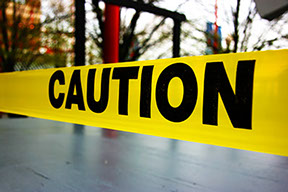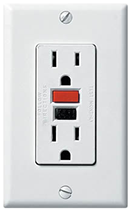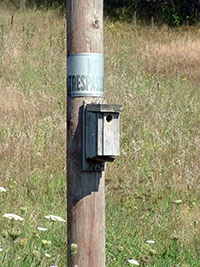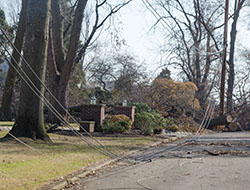


SEARCH MyCVEC
Outdoor Safety
After The Storm

![]() If power lines and poles are down in your yard or in the street, always treat them as if they were energized and dangerous. Never touch them! Stay away. Call CVEC to report the location so repairs can be made as soon as possible. 800-367-2832
If power lines and poles are down in your yard or in the street, always treat them as if they were energized and dangerous. Never touch them! Stay away. Call CVEC to report the location so repairs can be made as soon as possible. 800-367-2832
![]() Post-storm debris can hide power lines that have fallen. Fallen trees that contain energized power lines can energize any item it comes in contact with, such as a metal fence, a pond or standing water. Even the ground can be energized near fallen power lines. The real danger of fallen power lines is often hidden.
Post-storm debris can hide power lines that have fallen. Fallen trees that contain energized power lines can energize any item it comes in contact with, such as a metal fence, a pond or standing water. Even the ground can be energized near fallen power lines. The real danger of fallen power lines is often hidden.
![]() If your electric service is out, check with your neighbors to see if they have power. If they do, you may have only a blown fuse or a tripped breaker. Never replace a fuse or reset a circuit breaker with wet hands or while standing on a wet (or even damp) surface.
If your electric service is out, check with your neighbors to see if they have power. If they do, you may have only a blown fuse or a tripped breaker. Never replace a fuse or reset a circuit breaker with wet hands or while standing on a wet (or even damp) surface.
![]() If you're without electricity and want to use a portable generator, make sure you use it in a well-ventilated area. Don't connect the generator to your home's electrical panel or fuse boxes. It may cause electricity to feed back into the power lines, which can endanger linemen and damage electric service facilities.
If you're without electricity and want to use a portable generator, make sure you use it in a well-ventilated area. Don't connect the generator to your home's electrical panel or fuse boxes. It may cause electricity to feed back into the power lines, which can endanger linemen and damage electric service facilities.
![]() If possible, avoid using candles. If you must use candles, remember that open windows and gusty winds can knock them over or blow flammable materials into them, so be careful about where you place them.
If possible, avoid using candles. If you must use candles, remember that open windows and gusty winds can knock them over or blow flammable materials into them, so be careful about where you place them.
![]() If your power is out following a storm and you must cook food with Sterno or charcoal, remember to do so outside in a well-ventilated area. Cooking indoors with Sterno or charcoal will produce deadly carbon-monoxide fumes. Replenish your supplies of batteries, bottled water, non-perishable food items and firewood in preparation for future storms as soon as it’s reasonably possible.
If your power is out following a storm and you must cook food with Sterno or charcoal, remember to do so outside in a well-ventilated area. Cooking indoors with Sterno or charcoal will produce deadly carbon-monoxide fumes. Replenish your supplies of batteries, bottled water, non-perishable food items and firewood in preparation for future storms as soon as it’s reasonably possible.
Helping line crews is appreciated, but working with power lines and electricity requires a high degree of training. In order to restore power with the highest degree of safety, restoration must be accomplished in a certain order. Above all, the hard working men and women restoring your power appreciate your patience and understanding that they are doing everything they can to restore your power as quickly and safely as possible.
![]()
Electricity & Water Don’t Mix!
The Electrical Safety Foundation International (ESFI) warns of dangers that are present when water comes in contact with electricity. To reduce electrical hazards, ESFI offers the following safety advice:
![]() Summer is the season for swimming and boating. Awareness of electrical hazards around water can prevent deaths and injuries. Sailboats often have masts of 30 feet or more, which are dangerous when they come into contact with overhead power lines.
Summer is the season for swimming and boating. Awareness of electrical hazards around water can prevent deaths and injuries. Sailboats often have masts of 30 feet or more, which are dangerous when they come into contact with overhead power lines.
![]() Staying at least 10 feet away from overhead power lines can help prevent lethal electrical hazards.
Staying at least 10 feet away from overhead power lines can help prevent lethal electrical hazards.
![]() Use outlet covers on outdoor receptacles near swimming pools. Keep cords and electrical devices away from pools. Never handle electrical items when you are wet.
Use outlet covers on outdoor receptacles near swimming pools. Keep cords and electrical devices away from pools. Never handle electrical items when you are wet.

![]() Use a ground fault circuit interrupter (GFCI) to help prevent electrocutions and electrical shock injuries. Portable GFCIs require no tools to install and are available at prices ranging from $12 to $30.
Use a ground fault circuit interrupter (GFCI) to help prevent electrocutions and electrical shock injuries. Portable GFCIs require no tools to install and are available at prices ranging from $12 to $30.
![]() Electrical devices such as circuit breakers, fuses, GFCIs, receptacles, plugs and switches can malfunction when water and silt get inside. Replace those that have been submerged.
Electrical devices such as circuit breakers, fuses, GFCIs, receptacles, plugs and switches can malfunction when water and silt get inside. Replace those that have been submerged.
![]() Do not allow power cord connections to become wet.
Do not allow power cord connections to become wet.
![]() Outdoors, dangers such as power lines in contact with water can pose electrical hazards.
Outdoors, dangers such as power lines in contact with water can pose electrical hazards.
![]() Indoors, submerged outlets or electrical cords may be energizing the water, a potential lethal trap.
Indoors, submerged outlets or electrical cords may be energizing the water, a potential lethal trap.
![]() When using a wet-dry vacuum cleaner or a pressure washer, be sure to follow the manufacturer’s instructions to avoid electric shock.
When using a wet-dry vacuum cleaner or a pressure washer, be sure to follow the manufacturer’s instructions to avoid electric shock.
When water comes in contact with electricity:
![]() Flooded Areas: Take care when stepping into a flooded area, and be aware that submerged outlets or electrical cords may energize the water, posing a potential lethal trap.
Flooded Areas: Take care when stepping into a flooded area, and be aware that submerged outlets or electrical cords may energize the water, posing a potential lethal trap.
![]() Wet Electrical Equipment: Do not use electrical appliances that have been wet. Water can damage the motors in electrical appliances, such as furnaces, freezers, refrigerators, washing machines, and dryers. Electrical parts can become grounded and pose an electric shock hazard or overheat and cause a fire. A qualified service repair dealer should recondition electrical equipment that has been wet. Certain equipment will require complete replacement, while a trained professional can recondition other devices.
Wet Electrical Equipment: Do not use electrical appliances that have been wet. Water can damage the motors in electrical appliances, such as furnaces, freezers, refrigerators, washing machines, and dryers. Electrical parts can become grounded and pose an electric shock hazard or overheat and cause a fire. A qualified service repair dealer should recondition electrical equipment that has been wet. Certain equipment will require complete replacement, while a trained professional can recondition other devices.
![]()
Keep Poles Clean and Clear
Your Co-op asks that our utility poles not be used for anything other than their intended purpose ... carrying wires.
 Nails, staples, or any means of attaching signs and flyers create a safety hazard for the Co-op’s linemen when they have to climb the pole. Obstructions can affect getting a solid footing, causing a slip when climbing. There is also the risk that a lineman could tear an insulated glove or other protective equipment, creating a risk for electrocution.
Nails, staples, or any means of attaching signs and flyers create a safety hazard for the Co-op’s linemen when they have to climb the pole. Obstructions can affect getting a solid footing, causing a slip when climbing. There is also the risk that a lineman could tear an insulated glove or other protective equipment, creating a risk for electrocution.
![]() Don’t attach anything to a pole that will be difficult to climb around, such as birdhouses or feeders, basketball goals, or arbors for climbing plants.
Don’t attach anything to a pole that will be difficult to climb around, such as birdhouses or feeders, basketball goals, or arbors for climbing plants.
![]() Don’t use a utility pole as an element of any structure.
Don’t use a utility pole as an element of any structure.
![]() Don’t place landscaping around utility poles that can be damaged when the pole is climbed, or decorations that could hurt a lineman if he fell.
Don’t place landscaping around utility poles that can be damaged when the pole is climbed, or decorations that could hurt a lineman if he fell.
![]() Use common sense around utility poles . . . remember it might need to be accessed on foot or with a bucket truck in order to get your or your neighbor’s power back up in a timely and safe manner.
Use common sense around utility poles . . . remember it might need to be accessed on foot or with a bucket truck in order to get your or your neighbor’s power back up in a timely and safe manner.
![]()
Power Line Safety
Consumers need to be extra careful around power lines. Here’s some vital information to help ensure your safety around utility poles and power lines.

![]() Never touch any fallen wire. If you see a downed power line, immediately call CVEC at 800-367-2832 and 911.
Never touch any fallen wire. If you see a downed power line, immediately call CVEC at 800-367-2832 and 911.
![]() Move away from the line. The proper way to move away is to shuffle with small steps, keeping your feet together and on the ground at all times. This will minimize the potential for a strong electric shock. Electricity wants to move from a high voltage zone to a low voltage zone … and it could do that through your body.
Move away from the line. The proper way to move away is to shuffle with small steps, keeping your feet together and on the ground at all times. This will minimize the potential for a strong electric shock. Electricity wants to move from a high voltage zone to a low voltage zone … and it could do that through your body.
![]() Consider every wire on the ground to be energized and dangerous. Never touch fallen power lines, even if there are no sparks. Only qualified electric utility workers should attempt to move downed power lines. Call CVEC and 911.
Consider every wire on the ground to be energized and dangerous. Never touch fallen power lines, even if there are no sparks. Only qualified electric utility workers should attempt to move downed power lines. Call CVEC and 911.
![]() Never touch anything (cars, fences, people, etc.) that is in contact with a power line. You could be the next victim.
Never touch anything (cars, fences, people, etc.) that is in contact with a power line. You could be the next victim.
![]() If you see downed lines and the ground is wet or has standing water, do not go outside. Do not put your feet near water where a downed power line is located.
If you see downed lines and the ground is wet or has standing water, do not go outside. Do not put your feet near water where a downed power line is located.
![]() Don’t touch anything, including people, which have come in contact with power lines. Don’t attempt to move the person, the line or anything else. Do not attempt to move them with another object such as a broom or stick. Even non-conductive materials such as wood or cloth, if slightly wet, can conduct electricity. Keep others away.
Don’t touch anything, including people, which have come in contact with power lines. Don’t attempt to move the person, the line or anything else. Do not attempt to move them with another object such as a broom or stick. Even non-conductive materials such as wood or cloth, if slightly wet, can conduct electricity. Keep others away.
![]() Most people do not know the difference between telephone lines and power lines. To be safe, stay away from both.
Most people do not know the difference between telephone lines and power lines. To be safe, stay away from both.
![]() Do not approach a car that is touching power lines, even if there are people in the vehicle. Remain a safe distance away, keep anyone in the vehicle calm.
Do not approach a car that is touching power lines, even if there are people in the vehicle. Remain a safe distance away, keep anyone in the vehicle calm.
![]() If you are in a car that is touching power lines, stay in your car. You are grounded and safe. Call CVEC and 911. Tell others to stay away from your car.
If you are in a car that is touching power lines, stay in your car. You are grounded and safe. Call CVEC and 911. Tell others to stay away from your car.
![]() If you must leave your car because it’s on fire, jump out of the vehicle with both feet together and avoid contact with the live car and the ground at the same time. This way you avoid being the path of electricity from the car to the earth. Shuffle away from the car.
If you must leave your car because it’s on fire, jump out of the vehicle with both feet together and avoid contact with the live car and the ground at the same time. This way you avoid being the path of electricity from the car to the earth. Shuffle away from the car.
![]() Never drive over downed power lines. Even if they’re not energized, they can get tangled in your vehicle. Call CVEC and 911.
Never drive over downed power lines. Even if they’re not energized, they can get tangled in your vehicle. Call CVEC and 911.
![]() Do not attempt to cut or remove a tree that is, or could become, entangled with power lines.
Do not attempt to cut or remove a tree that is, or could become, entangled with power lines.
![]() If anyone in your household suffers an electric shock, call 911 or your local emergency medical service immediately. Even minor shocks can cause life-threatening conditions hours later, so it is important to seek medical attention.
If anyone in your household suffers an electric shock, call 911 or your local emergency medical service immediately. Even minor shocks can cause life-threatening conditions hours later, so it is important to seek medical attention.
In times of any dangerous or life threatening event,
never hesitate to call CVEC at 800-367-2832 and 911.
HOME | REPORT AN OUTAGE | PAY MY BILL | CONTACT CVEC
Phone: 434.263.8336 | Toll free: 800.367.2832 | Fax: 434.263.8339
Corporate Headquarters:
800 Cooperative Way
Arrington, VA 22922
Payments:
Dept. 1340 | PO Box 2153
Birmingham, AL 35287-1340
Correspondence:
P. O. Box 247
Lovingston, VA 22949
